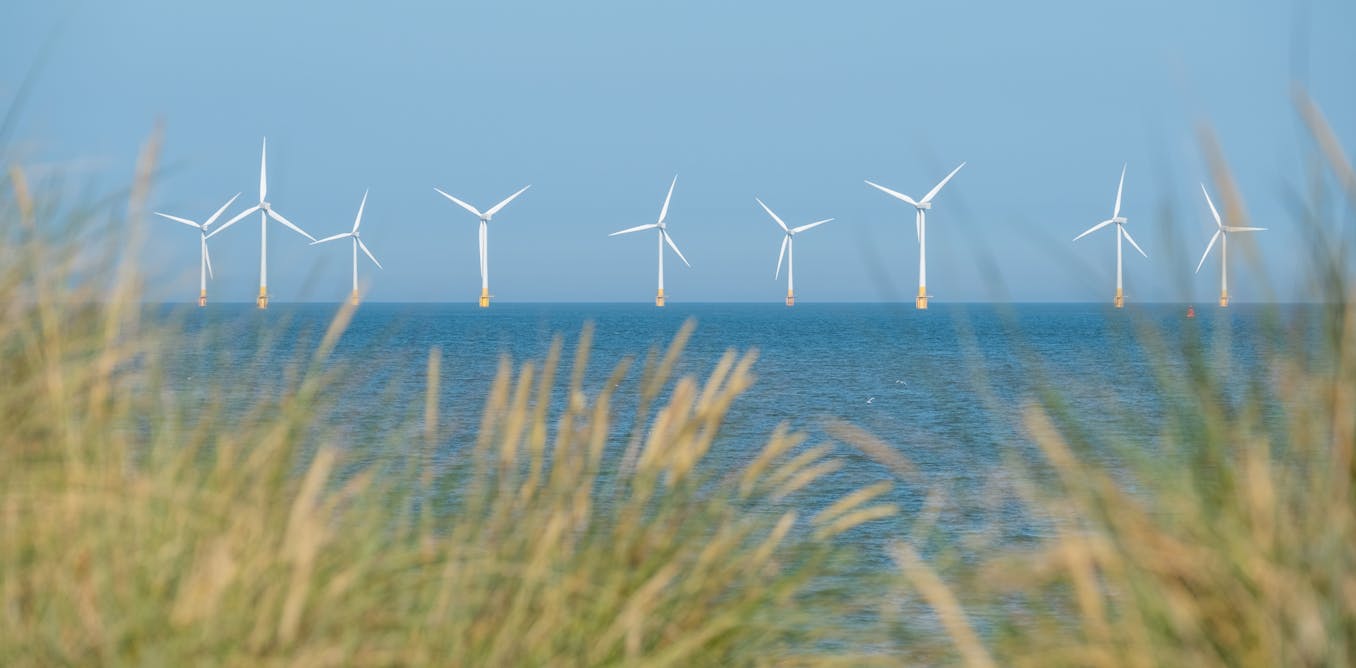A new feature film examining the buried trauma of America’s “Secret War” in Laos is seeking co-producers and sales agents at the Tokyo Gap-Financing Market, with production slated for 2026.
“Rhizome,” directed by Jakrawal…

A new feature film examining the buried trauma of America’s “Secret War” in Laos is seeking co-producers and sales agents at the Tokyo Gap-Financing Market, with production slated for 2026.
“Rhizome,” directed by Jakrawal…

(Bloomberg) — The record-setting advance in global equities took a breather in early Asian trading Tuesday, as investors braced for a flurry of megacap technology earnings and policy announcements from major central banks this week.
Equity gauges in Japan and South Korea retreated from record highs, while shares in Australia also fell at the open. US indexes closed at all-time highs as Chinese and US trade negotiators lined up an array of diplomatic wins for Donald Trump and Xi Jinping to unveil at a summit this week. An index of US-listed Chinese shares rose 1.6%.
The yen gained after seven consecutive days of weakening as a minister said the government will monitor the currency’s weakness. Gold rebounded after slumping more than 3% to trade below $4,000 an ounce in the previous session while a gauge of the dollar edged lower for a second day. Technology stocks will be in focus after Amazon.com Inc. planned to cut as many as 30,000 jobs, Reuters reported. Treasuries inched higher Tuesday.
Easing trade tensions have helped fuel a stock rally, while US companies have so far emerged largely unscathed by tariffs, protecting margins through price increases and cost cuts. That optimism faces a reality check this week as investors look to the Federal Reserve meeting for clues on the path of rate cuts, while major technology firms including Amazon and Microsoft Corp. reveal whether earnings momentum can be sustained.
“With the Fed on track to cut rates, extending the run would appear to hinge on this week’s lineup of high-profile earnings releases,” said Chris Larkin at E*Trade from Morgan Stanley. “And it may, barring any surprises in US-China trade negotiations.”
The S&P 500 topped 6,875 — notching its best three-day rally since May. Qualcomm Inc. shares rose to their highest price in 15 months after unveiling chips and computers for the lucrative AI data center market, aiming to challenge Nvidia Corp. in the fastest-growing part of the industry.
On Wednesday and Thursday, five firms that account for about a quarter of the US benchmark — Microsoft Corp., Alphabet Inc., Meta Platforms Inc., Amazon.com and Apple Inc. — will report results. A gauge of the “Magnificent Seven” megacaps jumped 2.6%.
On trade, Trump told reporters on Monday that “I really feel good” about a deal with China, after officials unveiled a slew of agreements to ease tensions.
Trump is in Tokyo Tuesday to meet with Japanese leaders.
While markets cheered the latest developments, some analysts cautioned the deal now teed up for Trump and Xi to sign in South Korea ignored thorny issues.
Fundamental fights over national security appeared untouched, they said, along with Trump’s stated core mission of rebalancing trade. Making that harder, Chinese investment into America remains heavily restricted.
“While these developments have lifted market spirits, analysts remain skeptical that the underlying issues — such as national security and tech competition — will be fully resolved,” said Fawad Razaqzada at City Index and Forex.com. “Nevertheless, traders have embraced the risk-on mood.”
Chinese bonds will also be in focus Tuesday after reports by state-owned media that the People’s Bank of China will restart its sovereign bond trading operations, a move that analysts said may be aimed at supporting the debt market and boosting liquidity.
Corporate News:
Domino’s Pizza Enterprises Ltd. shares soared after the Australian Financial Review reported Bain Capital is considering buying the fast-food chain in a deal worth as much as A$4 billion ($2.6 billion). Nidec Corp. shares tumbled as much as their daily limit of 19% on Tuesday as the company is set to be removed from the Nikkei 225 Stock Average and was flagged for special oversight by the Tokyo Stock Exchange. CSL Ltd. shares slumped after Australia’s largest drugmaker scrapped plans to complete a demerger of its Seqirus vaccines business by June 2026, citing heightened volatility in the US influenza vaccine market that it said would prevent the move from realizing full value for shareholders. Some of the main moves in markets:
Stocks
S&P 500 futures were little changed as of 9:56 a.m. Tokyo time Hang Seng futures rose 0.4% Nikkei 225 futures (OSE) fell 0.3% Japan’s Topix fell 0.5% Australia’s S&P/ASX 200 fell 0.4% Euro Stoxx 50 futures were little changed Currencies
The Bloomberg Dollar Spot Index was little changed The euro was little changed at $1.1656 The Japanese yen rose 0.2% to 152.52 per dollar The offshore yuan was little changed at 7.1048 per dollar The Australian dollar was little changed at $0.6559 Cryptocurrencies
Bitcoin fell 0.4% to $113,955.01 Ether fell 0.3% to $4,116.02 Bonds
The yield on 10-year Treasuries was little changed at 3.98% Japan’s 10-year yield declined 1.5 basis points to 1.650% Australia’s 10-year yield declined two basis points to 4.16% Commodities
West Texas Intermediate crude fell 0.2% to $61.19 a barrel Spot gold rose 0.6% to $4,006.35 an ounce This story was produced with the assistance of Bloomberg Automation.
©2025 Bloomberg L.P.

Trend Micro announced the efforts of the global security research community at Pwn2Own Ireland. Contestants discovered and disclosed 73 unique zero-day vulnerabilities in printers, network storage systems, smart home devices,…

Harman direct just dropped the price on one of its highest end portable speakers. Add the Harman Kardon Go + Play 3 to your shopping cart and the price ends up being just $159.99 shipped after a massive 60% off instant discount.

Renewable energy is often pitched as cheaper to produce than fossil fuel energy. To quantify whether this is true, we have been studying the financial impact of expanding wind energy in the UK. Our results are surprising.
From 2010 to 2023, wind power delivered a benefit of £147.5 billion — £14.2 billion from lower electricity prices and £133.3 billion from reduced natural gas prices. If we offset the £43.2 billion in wind energy subsidies, UK consumers saved £104.3 billion compared with what their energy bills would have been without investment in wind generation.
UK wind energy production has transformed over the past 15 years. In 2010, more than 75% of electricity was generated from fossil fuels. By 2025, coal has ceased and wind is the largest source of power at 30% – more than natural gas at 26%.
This massive expansion of UK offshore wind is partly due to UK government subsidies. The Contracts for Difference scheme provides a guaranteed price for electricity generated, so when the price drops below this level, electricity producers still get the same amount of money.
The expansion is also partly due to how well UK conditions suit offshore wind. The North Sea provides both ample winds and relatively shallow waters that make installation more accessible.
Read more:
How a more flexible energy grid can cope better with swings in Britain’s weather
The positive contribution of wind power to reducing the UK’s carbon footprint is well known. According to Christopher Vogel, a professor of engineering who specialises in offshore renewables at the University of Oxford, wind turbines in the UK recoup the energy used in their manufacture, transport and installation within 12-to-24 months, and they can generate electricity for 20-to-25 years. The financial benefits of wind power have largely been overlooked though, until now.
Our study explores the economics of wind in the energy system. We take a long-term modelling approach and consider what would happen if the UK had continued to invest in gas instead of wind generation. In this scenario, the result is a significant increased demand for gas and therefore higher prices. Unlike previous short-term modelling studies, this approach highlights the longer-term financial benefit that wind has delivered to the UK consumer.
Central to this study is the assumption that without the additional wind energy, the UK would have needed new gas capacity. This alternative scenario of gas rather than wind generation in Europe implies an annual, ongoing increase in UK demand for gas larger than the reduction in Russian pipeline gas that caused the energy crisis of 2022.
Given the significant increase in the cost of natural gas, we calculate the UK would have paid an extra £133.3 billion for energy between 2010 and 2023.
There was also a direct financial benefit from wind generation in lower electricity prices – about £14.2 billion. This combined saving is far larger than the total wind subsidies in that period of £43.2 billion, amounting to a net benefit to UK consumers of £104.3 billion.
Wind generators reduce market prices, creating value for others while limiting their own profitability. This is the mirror image of industries with negative environmental consequences, such as tobacco and sugar, where the industry does not pay for the increased associated healthcare costs.
This means that the profitability of wind generators is a flawed measure of the financial value of the sector to the UK. The payments via the UK government are not subsidies creating an industry with excess profits, or one creating a financial drain. They are investments facilitating cheaper energy for UK consumers.
Wind power should be viewed as a public good — like roads or schools — where government support leads to national gains. The current funding model makes electricity users bear the cost while gas users benefit. This huge subsidy to gas consumers raises fairness concerns.
Wind investment has significantly lowered fossil fuel prices, underscoring the need for a strategic, equitable energy policy that aligns with long-term national interests. Reframing UK government support as a high-return national investment rather than a subsidy would be more accurate and effective.
Sustainability, security and affordability do not need to be in conflict. Wind energy is essential for energy security and climate goals – plus it makes over £100 billion of financial sense.

Don’t have time to read about climate change as much as you’d like?
Get a weekly roundup in your inbox instead. Every Wednesday, The Conversation’s environment editor writes Imagine, a short email that goes a little deeper into just one climate issue. Join the 45,000+ readers who’ve subscribed so far.